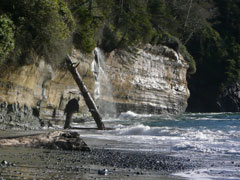About John G. Fitch: Early Years
Born in the middle of World War Two, I was fortunate to survive my infancy, since it was spent in the East End of London, an area that was being heavily bombed in those years. In the post-war years I benefitted from the social idealism which led to the establishment of a first-rate academic school, the East Ham Grammar School for Boys, in this essentially working-class district. Here I started Latin at age 12 and Greek at 13 and was quickly hooked on the ancient world, under the influence of the headmaster J.L. Whiteley and a charismatic teacher P.H. Vennis. My studious inclinations were fostered by my staunchly Baptist parents, who like many Nonconformist families had a strong belief in the value of education. There was also the practical fact that since we had no T.V., and little money for films or theatre (which were in any case regarded as morally dubious), there were few distractions from study.
From E.H.G.S. I moved to the more rarified atmosphere of King’s College, Cambridge. The faculty here were distinguished, but I found the academic programme uninspiring, though stimulation was provided by lectures from John Raven and M.I. Finley in Classics and F.R. Leavis in English. I rather wish that, instead of accepting my headmaster’s direction to go to Cambridge, I had followed my own inclination and gone to Bristol, which at that time offered an appealing joint degree programme in Classics and Drama.
After Cambridge, I fulfilled a longstanding ambition by heading for Africa. For two years I taught English and Classics at a secondary school in Jamestown, the old heart of Accra, Ghana. This was followed, back in England, by a one-year Certificate of Education, and then by three years of Classics teaching at the wonderful Cheadle Hulme School. One of my colleagues here was Linda Smith; we were married in 1969.
 By now I had come to realize that teaching, however enjoyable in the ideal environment of C.H.S., did not allow sufficient time for development of my own ideas and academic pursuits. I therefore began graduate work in the Department of Classics at the University of Texas, Austin, which at that time was in the forefront of literary studies, publishing the pioneer journal “Arion”. Here I began to study Seneca’s tragedies under the inspiring supervision of Frederick M. Ahl, and when he moved to Cornell University in 1971, I moved with him, and completed my Ph.D. there.
By now I had come to realize that teaching, however enjoyable in the ideal environment of C.H.S., did not allow sufficient time for development of my own ideas and academic pursuits. I therefore began graduate work in the Department of Classics at the University of Texas, Austin, which at that time was in the forefront of literary studies, publishing the pioneer journal “Arion”. Here I began to study Seneca’s tragedies under the inspiring supervision of Frederick M. Ahl, and when he moved to Cornell University in 1971, I moved with him, and completed my Ph.D. there.
A year of teaching at Ball State University was followed by an offer of a position at The University of Victoria in 1973, and here I remained until retiring as Professor and Chair in 1999.
